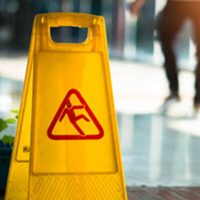Does Florida Law Require The Use Of “Wet Floor” Signs?

A lot of slip and fall accidents occur because the walking surface in question was wet, either because of a spill, a leak, or inclement weather. For this reason, many states require businesses to place signs warning visitors of potentially wet floors. While commercial establishments, government agencies, and other property owners that see a lot of visitors are encouraged to take these kinds of precautionary measures to help prevent accidents, it isn’t actually required in Florida. Still, a failure to post this kind of sign can be used by a slip and fall victim to strengthen his or her claim when filing suit against a negligent property owner.
Florida’s Slip and Fall Law
In Florida, premises liability cases fall under the category of general negligence, which means that, when trying to recover compensation after an accident, the injured party will need to prove that the property owner failed to adhere to certain standards, which includes keeping properties free of hazards that could injure a visitor, as a result of which, he or she sustained an injury. These obligations apply to some degree to all property owners in Florida, but are more strict for those who invite others onto their premises for business purposes. These property owners have to go to the greatest lengths to protect their visitors from being injured in slip and fall accidents.
Florida’s Transitory Substances Law
Although Florida law doesn’t require property owners to take certain steps when there are spills or leaks on their premises, it does have what is known as a transitory foreign substances law that applies to business establishments. Under this law, injured parties who slip and fall on something wet will need to prove that the property owner in question had actual or constructive knowledge of the spill, but failed to take steps to fix it. In states where “wet floor” signs are required, evidence of a failure to use such a sign would constitute strong evidence of negligence. While this isn’t the case in Florida, evidence that a property owner knew of a spill, but didn’t take any steps to warn visitors by placing signs or cordoning off the area, can be used by claimants as evidence of a property owner’s carelessness. Similarly, if a property owner did place a “wet floor” sign near the spill, but the visitor ignored it and fell anyway, the owner could use this as strong evidence of the steps it took to prevent an injury and could probably expect a comparative negligence against the visitor as a result.
Call Our Tampa Office to Schedule a Meeting with Our Legal Team
A property owner’s use of or failure to use a “wet floor” sign could have important repercussions for your slip and fall case. At Anderson & Anderson, we know how to use the facts of your case, including whether a property owner used such a warning, to your advantage. Call us at 813-251-0072 to learn more about how our experienced Miami slip and fall lawyers could help with your case.
Sources:
leg.state.fl.us/Statutes/index.cfm?App_mode=Display_Statute&URL=0700-0799/0768/Sections/0768.0755.html
leg.state.fl.us/statutes/index.cfm?App_mode=Display_Statute&URL=0700-0799/0768/Sections/0768.81.html
